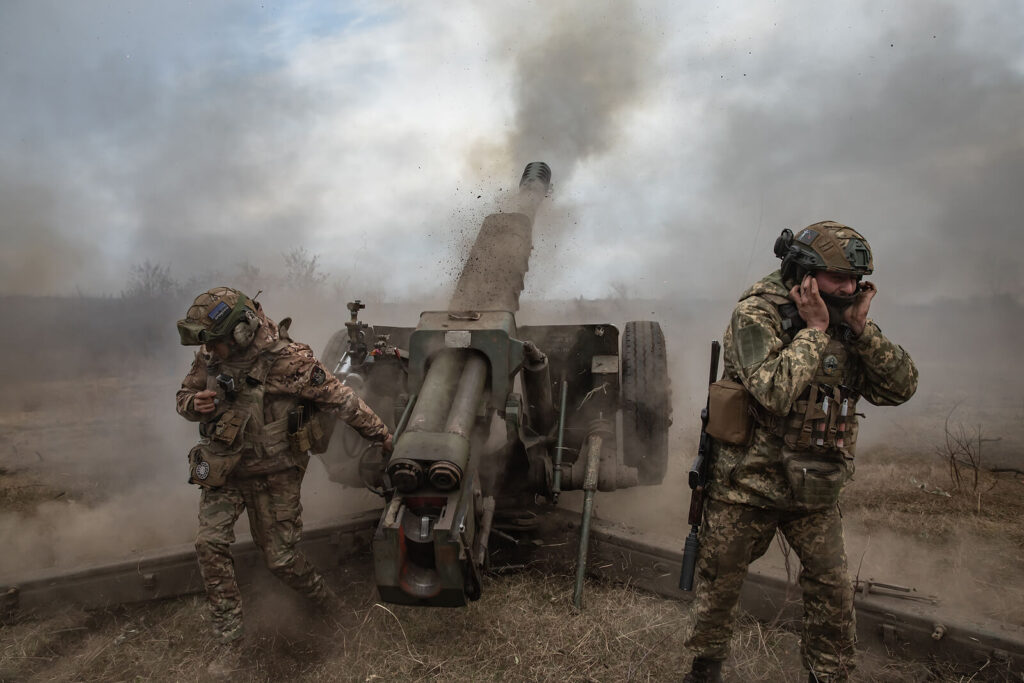Sen. Rand Paul, R-Ky., has authored numerous articles arguing against U.S. aid to Ukraine. During recent efforts to prevent a government shutdown, he took to the Senate floor and threatened to block any bill to extend government funding that included funding for Ukraine.
Sen. Paul asserts that the U.S. is: spending money better spent at home; that it is increasing the deficit, which puts our own financial future in jeopardy; that it is providing truckloads of cash to Ukraine with little accountability and aiding a former Russian state riddled with corruption; that it persecutes religious groups; and, that it relieves Europe of the responsibility to confront Russia.
Sen. Paul is fueling those on the political left and right who don’t see a clear link to U.S. strategic interests.
Both of us have extensive experience in European affairs, and we couldn’t disagree more vociferously. We believe the U.S. strategic interest in the Ukraine conflict is crystal clear — to remove a major threat to U.S. security. In reality, Ukraine is fighting our war, because if Vladimir Putin defeats Ukraine, he won’t stop there.
The Russia-Ukraine conflict is not an isolated event as some like Sen. Paul might believe. Putin’s strategic goal is to make Russia great again and a major player on the international stage. If he is successful with Ukraine, he is likely to turn on other former members of the defunct Soviet Union and Warsaw Pact, some of which are now NATO members.
Ending U.S. support for Ukraine would be a disaster for U.S. security. If Russia prevails, Europe will be destabilized for the indefinite future and NATO likely forced to defend one or more of its members. As it did in World Wars I and II and now as a NATO member, the U.S. would help defend Europe because this region is vital to U.S. economic and political interests.
And Chinese President Xi, witnessing the failure of the West to prevent a Russian land grab, might be further emboldened to invade Taiwan.
Where Sen. Paul is wrong about Ukraine
Assertion: Funds going to Ukraine could be spent better at home.
Fact: Much of the money is being spent in the U.S.
The Center for Strategic and International Studies has been tracking aid to Ukraine since the conflict began. In all, about $68 billion of the $113 billion authorized by Congress (60%) is being spent domestically to support the U.S. military and defense industrial base.
We send Ukraine older equipment, and the military services calculate a price for those items, then the “Aid for Ukraine” legislation reimburses the services so they can backfill with newer models facilitating military modernization. This process also helps create and support U.S. Jobs.
Assertion: The U.S. gives Ukraine cash with little accountability.
Fact: First, we do not simply hand Ukraine large amounts of cash.
What cash we do send to Ukraine is given to vetted non-governmental organizations for humanitarian aid or to companies that replace destroyed Ukrainian infrastructure. We also provide guaranteed loans with which Ukraine, under our supervision, can purchase humanitarian items and weapons.
As for accountability, there is a U.S. general with a team of military personnel at our embassy in Kiev whose sole job is to track U.S. weapons given to the Ukrainians. They use bar codes, GPS devices and various other means of tracking and have said repeatedly the Ukrainians are cooperating and totally transparent. Ukraine recently turned over a data base to the U.S. Embassy that accounts for all U.S. aid provided.
Assertion: Much of our support is wasted due to Ukrainian corruption.
Fact: “Transparency International” ranks dozens of countries with worse problems than Ukraine, including our major trading partner, Mexico.
We cannot let Ukraine lose just because they have not yet solved their corruption problems. Ukraine is suffering from hundreds of years of being tethered to Russia, one of the most corrupt societies on Earth, but they are trying to overcome this history. President Zelensky recently removed his defense minister and got rid of all six of the deputy ministers over corruption problems. And he fired all the regional military recruiting agents because they were taking bribes.
Ukraine badly wants to join the European Union and NATO, and Zelensky knows they must clean up the corruption to do that.
Assertion: Ukraine is squelching religious groups.
Fact: Ukraine is working to mitigate Putin’s network within the country.
To depict Ukraine as unworthy of U.S. aid, Sen. Paul points out President Zelensky shut down the Russian Orthodox Church’s activities in Ukraine. But Ukraine asserts that the head of the Russian Orthodox Church is an ex-KGB associate of Putin’s and that its priests, to include those in Ukraine, preach support for Russia’s invasion and have refused to christen the babies of Ukrainian servicemen or to hold services for fallen Ukrainian soldiers.
Assertion: Ukraine is a problem solely for the Europeans.
Fact: History shows our interests are embedded in Europe. To sit on the sidelines would be a major misread of the lessons of history. A world with Russia on the march into the heart of Europe is a threat to all, not just Europe.
In terms of support, the Europeans are stepping up. The Russian attack tore the blinders off European leaders who had thought they could have normal relations with Russia. Under U.S. leadership, NATO is reenergized, and members are increasing their armaments as well as helping to support Ukraine’s requirements. Two traditionally neutral European states, Finland and Sweden, seeing clearly the threat posed by a resurgent Russia, decided to abandon neutrality and join NATO.
Sen. Paul uses half-truths that may be appealing to some Americans. They should know the whole truth and understand the stark consequences if we fail to maintain our resolve.







